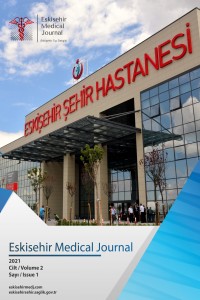Could Assisted Reproductive Technology Be a Predisposing Risk Factor for COVID-19 Infection in Women?
Öz
Introduction: The treatment agents used in assisted reproductive technology (ART) treatments could cause supra-physiologic hormone levels. We aimed to show if the ART could be a predisposing risk factor to be positive for Coronavirus Disease 2019 (COVID-19).
Methods: The data of the 43 infertility patients who were treated with ART between 1 March and 1 December 2020 at a Reproductive Endocrinology and Infertility Unit of a tertiary center were collected retrospectively. These patients were phoned and asked if they wanted to participate in the study; they were positive for COVID-19 or had a symptom of the illness.
Results: It was found that only 1 (2.4%) case had COVID-19 after the ART treatment, had a loss of smell and taste. The remaining
treated 42 cases had no symptoms of COVID-19 or a diagnosis with COVID-19.
Conclusion: When turning to normal practice life, all patients should be evaluated for COVID-19 during pre, per, and posttreatment time in order to stop the ART and protect against the cases from the possible side effects of assisted reproductive treatments, especially the possible, but undefined, predisposition factor to COVID-19.
Anahtar Kelimeler
Covid-19 assisted reproductive technology risk factors prognosis
Kaynakça
- 1. American Society for Reproductive Medicine (ASRM). Patient management and clinical recommendations during the coronavirus (COVID-19) pandemic. Retrieved from https://www.asrm.org/globalassets/asrm/asrm-content/news-andpublications/covid-19/covidtaskforce.pdf. Accessed 25.05.2020.
- 2. ESHRE. Guidance on recommencing art treatments. Retrieved from https://www.eshre.eu/Home/COVID19WG. Accessed 25.05.2020.
- 3. Chen N, Zhou M, Dong X, et al. Epidemiological and clinical characteristics of 99 cases of 2019 novel coronavirus pneumonia in Wuhan, China: a descriptive study. Lancet. 2020; 395(10223):507-13.
- 4. Suba Z. Prevention and therapy of COVID-19 via exogenous estrogen treatment for both male and female patients. J Pharm Pharm Sci. 2020; 23(1): 75-85.
- 5. Kovats S. Estrogen receptors regulate innate immune cells and signaling pathways. Cell Immunol. 2015; 294(2): 63‐69.
- 6. Joo B, Park S, An B, et al. Serum estradiol levels during controlled ovarian hyperstimulation influence the pregnancy outcome of in vitro fertilization in a concentration-dependent manner. Fertil Steril. 2010; 93(2): 442-6.
- 7. Di Mascio D, Khalil A, Saccone G, et al. Outcome of Coronavirus spectrum infections (SARS, MERS, COVID-19) during pregnancy: a systematic review and meta-analysis Am J Obstet Gynecol MFM. 2020; 2(2): 100107.
- 8. Hantoushzadeh S, Shamshirsaz A, Aleyasin A, et al. Maternal death due to COVID-19 Am J Obstet Gynecol 2020; S0002-9378(20)30516-0.
- 9. Mayeur A, Binois O, Gallot V, et al. First follow-up of art pregnancies in the context of the COVID-19 outbreak. Eur J Obstet Gynecol Reprod Biol. 2020 Oct; 253: 71-5.
Yardımcı Üreme Teknolojileri Kadınlarda COVID-19 Enfeksiyonu için Predispozan Bir Risk Faktörü Olabilir Mi?
Öz
Giriş: Yardımcı üreme teknolojisi (YÜT) tedavilerinde kullanılan tedavi ajanları, suprafizyolojik hormon seviyelerine neden olabilir. YÜT'ün Koronavirüs Hastalığı 2019 (COVID-19)'na yakalanmak için bir risk faktörü olup olmadığını göstermeyi amaçladık
Yöntemler: 1 Mart - 1 Aralık 2020 tarihleri arasında üçüncü basamak bir merkezin Üreme Endokrinolojisi ve İnfertilite Ünitesi'nde YÜT ile tedavi edilen 43 infertilite hastasının verileri geriye dönük olarak tarandı. Bu hastalara telefonla ulaşıldı, araştırmaya katılmak isteyip istemedikleri; COVID-19 tanısı alıp almadıkları veya hastalık semptomu taşıyıp taşımadıkları soruldu.
Bulgular: Görüşme sırasında sadece 1 (% 2,4) vakanın tedavi sonrası dönemde COVID-19'a yakalandığı tespit edildi ve o kişide
koku ve tat kaybı hala devam ediyordu. Geri kalan tedavi alan 42 hastada COVID-19 semptomu yoktu veya COVID-19 için pozitif
bir test sonucunun olmadığı saptandı.
Sonuç: Normal çalışma hayatına dönerken, YÜT'ü durdurmalı ve özellikle mümkün olan yardımcı üreme tedavilerinin olası yan
etkilerinden vakaları korunmak için tüm hastalar tedavi öncesi, sırası ve sonrası dönemde COVID-19 açısından değerlendirilmelidir.
Anahtar Kelimeler
Kaynakça
- 1. American Society for Reproductive Medicine (ASRM). Patient management and clinical recommendations during the coronavirus (COVID-19) pandemic. Retrieved from https://www.asrm.org/globalassets/asrm/asrm-content/news-andpublications/covid-19/covidtaskforce.pdf. Accessed 25.05.2020.
- 2. ESHRE. Guidance on recommencing art treatments. Retrieved from https://www.eshre.eu/Home/COVID19WG. Accessed 25.05.2020.
- 3. Chen N, Zhou M, Dong X, et al. Epidemiological and clinical characteristics of 99 cases of 2019 novel coronavirus pneumonia in Wuhan, China: a descriptive study. Lancet. 2020; 395(10223):507-13.
- 4. Suba Z. Prevention and therapy of COVID-19 via exogenous estrogen treatment for both male and female patients. J Pharm Pharm Sci. 2020; 23(1): 75-85.
- 5. Kovats S. Estrogen receptors regulate innate immune cells and signaling pathways. Cell Immunol. 2015; 294(2): 63‐69.
- 6. Joo B, Park S, An B, et al. Serum estradiol levels during controlled ovarian hyperstimulation influence the pregnancy outcome of in vitro fertilization in a concentration-dependent manner. Fertil Steril. 2010; 93(2): 442-6.
- 7. Di Mascio D, Khalil A, Saccone G, et al. Outcome of Coronavirus spectrum infections (SARS, MERS, COVID-19) during pregnancy: a systematic review and meta-analysis Am J Obstet Gynecol MFM. 2020; 2(2): 100107.
- 8. Hantoushzadeh S, Shamshirsaz A, Aleyasin A, et al. Maternal death due to COVID-19 Am J Obstet Gynecol 2020; S0002-9378(20)30516-0.
- 9. Mayeur A, Binois O, Gallot V, et al. First follow-up of art pregnancies in the context of the COVID-19 outbreak. Eur J Obstet Gynecol Reprod Biol. 2020 Oct; 253: 71-5.
Ayrıntılar
| Birincil Dil | İngilizce |
|---|---|
| Konular | Hemşirelik |
| Bölüm | Araştırma Makaleleri |
| Yazarlar | |
| Yayımlanma Tarihi | 6 Mart 2021 |
| Yayımlandığı Sayı | Yıl 2021 Cilt: 2 Sayı: 1 |
Kaynak Göster

Bu eser Creative Commons Alıntı-GayriTicari-Türetilemez 4.0 Uluslararası Lisansı ile lisanslanmıştır.


